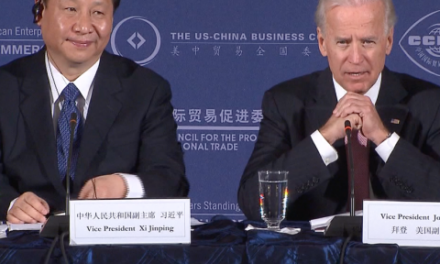We support our Publishers and Content Creators. You can view this story on their website by CLICKING HERE.

Elise Stefanik, a champion of Israel, faces the daunting task at the United Nations of working to maintain international order and American credibility as a world leader, while fighting uphill for Jerusalem at an institution that regards the Jewish state with skepticism, if not outright hostility.
The International Criminal Court’s recent decision to issue arrest warrants for Israeli Prime Minister Benjamin Netanyahu, former Defense Minister Yoav Gallant, and multiple Hamas leaders on Thursday, however is likely to complicate American messaging on the world stage.
Trump this month tapped the House Republican conference chairwoman to serve as U.S. Ambassador to the United Nations, noting that she “led the charge against antisemitism on college campuses.” Stefanik attracted attention by scrutinizing the leaders of major American universities about reports of antisemitism on their campuses after the Oct. 7 Hamas attack on Israel.
“She will be an incredible Ambassador to the United Nations, delivering Peace through Strength and America First National Security policies!” Trump said. Trump’s pick for the job in his first term was Nikki Haley, who ultimately ran against him in the 2024 Republican primary. The president-elect has confirmed Haley will not return to the administration.
His first term saw Washington adopt a critical tone toward major international institutions and he evidently aims to maintain that stance with Stefanik in New York. Here’s a look at some of the biggest challenges she will face:
Arrest warrants for Netanyahu and Putin
The ICC is separate from the U.N.-operated International Court of Justice and the U.S. is not a party to the ICC. Nonetheless, it is a major international organization and America’s relations with it are sure to prove a point of contention on the world stage with which Stefanik must contend.
The U.S. has thrown its support behind the ICC arrest warrant for Russian President Vladimir Putin. President Biden cheered the Putin warrant, saying it “makes a very strong point.” But Republicans in Congress and incoming members of the Trump administration are livid with the court over the Netanyahu warrants, deeming them illegitimate and unlawful.
“The ICC’s arrest warrant against Prime Minister Netanyahu and former Defense Minister Gallant is outrageous, unlawful, and dangerous,” said Republican Senate leader John Thune, S.D. “Leader Schumer should bring a bill to the floor sanctioning the ICC. If he chooses not to act, the new Senate Republican majority next year will.”
“The ICC has no credibility and these allegations have been refuted by the U.S. government,” said Rep. Mike Waltz, R-Fla., Trump’s pick to serve as national security advisor. “Israel has lawfully defended its people & borders from genocidal terrorists. You can expect a strong response to the antisemitic bias of the ICC & UN come January.”
“It is, it’s outrageous. There’s really not much more to say, other than it is outrageous,” Sen. Ron Johnson, R-Wisc., said on the “Just the News, No Noise” TV show. “I know there was an awful lot of talk internally… I know Lindsey Graham is, I think, sponsoring a bill right off the bat here as well, so that there will be strong bipartisan pushback against this outrageous action, taken by the ICC.”
Some Republicans have faced allegations of hypocrisy after cheering the Putin warrant while condemning Netanyahu’s. Sen. Lindsey Graham’s, R-S.C., prior X post calling the ICC an “international evidence-based body” and declaring the warrant likely to “stand the test of history” went viral after he called the Netanyahu decision “outrageous” and vowed to sanction the court.
Neither Israel nor the U.S. are signatories
Neither the United States and Israel are signatories to the Rome Treaty that established the ICC and it officially holds no sway within their borders. The Russians withdrew from the court after it issued the warrant for Putin. Theoretically, however, should Putin, Netanyahu, or anyone subject to a warrant from the ICC enter a signatory nation, they could face arrest.
One hundred twenty-four countries are state parties to the Rome Statute, including most of Europe, Africa, Latin America, and Australia. Rep. Ilhan Omar, D-Minn., previously introduced legislation to make the U.S. a full party to the ICC, arguing that it would help U.S. efforts to hold Putin accountable for his alleged war crimes in Ukraine. The measure would have required two-thirds support in the Senate and did not clear Congress.
ICC warrants are, of course, contingent on compliance by member nations. Putin’s international travel has drawn headlines in light of the warrant against him. His September visit to Mongolia, a signatory, notably attracted attention for Ulaanbaatar’s lack of action.
Russia was a signatory to the Rome Statute until 2016, when it withdrew its signature over a report on its annexation of Crimea. Moscow never ratified the treaty. The U.S. and Israel both signed the Rome Statute, but never ratified the treaty, placing those nations on similar footing to Russia when the court issued its warrant for Putin.
Fears of American arrests
With the ICC issuing arrest warrants for citizens of non-party nations, some are concerned that Americans could find themselves subject to a warrant from an international body to which their own country does not belong. But the Trump administration, in 2020, outlined its position on the ICC’s jurisdiction, essentially stating that the court had no authority to prosecute Americans at all.
“The ICC cannot subject Americans to arrest, prosecution, and jail,” then-Secretary of State Mike Pompeo said in 2020. “The U.S. is not a party to the Rome Statute that created the ICC. Even if a prosecution were to proceed, it would make a mockery of due process.”
“There’s no requirement for unanimity for a conviction, the prosecution can rely on hearsay to obtain a conviction, there’s no real guarantee of a speedy trial,” he continued. “Instead of facing a jury of one’s peers, it’s a panel of judges, who aren’t subject to any American accountability.”
UN Relief and Works Agency for Palestine Refugees in the Near East (UNRWA)
It won’t just be the ICC at issue for the U.S. A major relief organization of the international body, the UNRWA has come under intense scrutiny amid the Israel-Hamas conflict and its links to the Gaza-based terror group. The UNRWA confirmed in September of this year that it had employed Hamas commander Fateh Sherif Abu el-Amin, but denied knowing of his connections with Hamas.
The Trump administration previously pulled funding from the UNRWA, though the Biden administration reversed that decision. Congress subsequently passed a one-year ban on UNRWA funding that is set to expire in March.
Stefanik called the admission the “latest proof that the United Nations has become a cesspool of antisemitism” and called on Biden to “permanently cut off UNRWA funding, revoke its tax-exempt status, and provide oversight of every U.S. dollar the UN receives.”
Ceasefire resolutions
The United Nations General Assembly and the Security Council have repeatedly held votes calling for a ceasefire between Israel and Hamas. Stefanik has been an outspoken critic of those resolutions.
Ahead of a vote on a measure condemning Israeli settlements in the West Bank, Stefanik demanded that Biden “show strength on the world stage and clearly condemn the blatant anti-Israel bias in the United Nations.”
“His UN Ambassador must veto the anti-Israel resolution in front of the UN Security Council and send a clear message that the U.S. stands with Israel,” she added.
More such votes are expected to take place when Stefanik arrives in New York.

 Conservative
Conservative  Search
Search Trending
Trending Current News
Current News 





